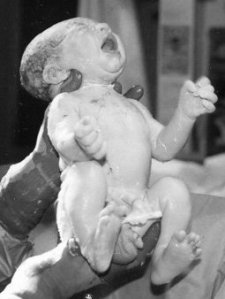NOTEWORTHY WEDNESDAY!

Breast is best…the comments…
“So overall, yes, breast is probably best. But not so much better that formula deserves the label of “public health menace,” alongside smoking. Given what we know so far, it seems reasonable to put breast-feeding’s health benefits on the plus side of the ledger and other things—modesty, independence, career, sanity—on the minus side, and then tally them up and make a decision. But in this risk-averse age of parenting, that’s not how it’s done.
….
My best guess is something I can’t quite articulate. Breast-feeding does not belong in the realm of facts and hard numbers; it is much too intimate and elemental. It contains all of my awe about motherhood, and also my ambivalence. Right now, even part-time, it’s a strain. But I also know that this is probably my last chance to feel warm baby skin up against mine, and one day I will miss it.
via The Case Against Breast-Feeding – Magazine – The Atlantic.
Here’s my message to other moms anxious about formula-feeding: If you absolutely hate breastfeeding for whatever reason, stop. Let it (and the guilt) go. Breastfeeding may be healthier than formula, but the formula they’re making these days is pretty awesome, too. The extra nutrients and antibodies a woman’s breast milk provides may not be worth crying every time you have to breastfeed. The truth is that your child can thrive on breast milk or formula, but an unhappy mama does not a healthy baby make. So let’s stop using how we feed our babies as an occasion to make ourselves — or other moms — miserable.
Not breastfeeding and feeding baby formula don’t make you a bad mother.”
My thoughts…
Breast Feeding has been in the news this past week with the IRS giving moms a tax-break on breast pumps. Finally, there is recognition for moms who need pumps for a myriad of reasons to help them continue to breastfeed.
Let me start out by acknowledging that I did not breastfeed either one of my children…it was a decision I made without any guilt even though I was a maternal-child nurse and had a fair amount of knowledge about breastfeeding.
It was part of my job to help women with breast feeding after delivery and during their post partum hospital stay which in the 70’s when I began my career was on average 4-5 days for a vaginal delivery and 7-8 days for a c-section, unlike today’s very brief hospital stays after delivery. Nurses played an important role in mother-baby care for more of an extended period of time in those days of lengthier hospital stays.
Breast feeding was really on the upswing in New York City during the 70’s and many moms were choosing it as an option.
Often the first couple of days breast feeding would go fairly smoothly. It was a learning time for both mother and baby. It seemed that gentle coaxing and encouragement gave a new mom and baby all they needed.
Then on the third post-partum day something dramatic occurred…. mom’s milk came in and the “honeymoon” period for mother and baby was usually over.
At this point, sometimes mom would even have a slight fever and be somewhat uncomfortable until baby breast fed and relieved the pressure from her warm breasts…but other moms would be initially so engorged with milk they would be crying as would baby who was having difficulty attaching to mom’s rock hard nipples. Then for some moms there was the problem of sore nipples to contend with…ouch!
Moms seemed to have a difficult time with all these adjustments in the hospital atmosphere, rooming-in was encouraged but there were still schedules to contend with and those were not always conducive to the calming conditions that are needed for mom and baby to successfully begin breastfeeding.. If the mom was recovering from a c-section the scene was usually more complicated and more painful for her. This usually added to her frustration which carried of course over to her newborn. Nurses tried their best to encourage and provide a soothing setting for both mom and baby so that they both could enjoy the breastfeeding experience which was known to be so important.
Newborn care in the hospital in those days was slightly different as well, due to the extended length of stay. Baby’s weight would be closely monitored as would any level of jaundice. Jaundice is a threatening condition depending upon many factors. Feeding encourages babies to pass stool which excretes bilirubin which causes jaundice…if baby does not get enough liquid this can cause a problem. Breast feeding was always something that caused some concern…as to whether the baby was getting enough milk… now I am not saying that breast feeding causes jaundice but many factors enter in to the picture here and feeding whether bottle or breast is observed closely if jaundice is a problem.
Even in the 70’s we knew that “breast was best” but it seemed that we did not freak out when mothers made the decision to formula feed their newborn…we realized that it was their choice as it is today. Bonding was encouraged and healthy feeding techniques were taught. Skin to skin touch was emphasized.
My decision to formula feed… was not by choice. I was taking medications that were excreted in breast milk. These medications would have been very problematic for my baby so breastfeeding was not an option. The decision was really made for me…in all honesty after working with post-partum moms I was not sure I was up to the task. It had always been super amazing to me to see the adjustment period of mom and baby to breastfeeding just as amazing perhaps as the birth of each child.
I honestly believe breast or bottle feeding does not determine what kind of mother you are…there are so many factors that go into mothering and parenting it is a wonder that any of us make it through to adulthood.
One thing I have learned is that children do take a village to raise and it starts at birth…adequate support is important to get mom and baby off to a good start. I believe that we all need to recognize our own prejudices and allow others to self determine without pressure.
In the end, we are not raising another mom’s child and really don’t we have enough to do raising our own?







